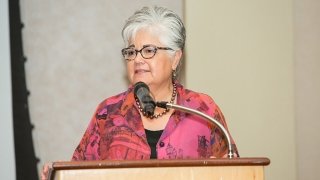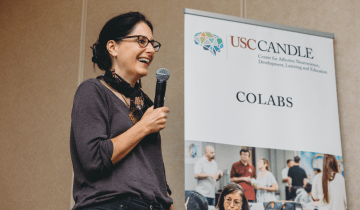Editor’s Note: Associate Dean Darline Robles leads USC Rossier’s new Office of Equity and Community Engagement. In an interview, she discussed the office’s scope, as well as its goal to become a resource for educators and institutions seeking solutions to complex challenges. (This interview has been edited for length and clarity.)
The Office of Equity and Community Engagement will encompass three distinct, but interrelated programs: Equity and inclusion, community and civic engagement, and professional development. Can you describe how these three areas are related?
I’m going to start with community engagement. We sit in the middle of a large metropolitan area, and we have context not only in Southern California, but nationally and internationally. How do we begin to see our footprint so to speak, and our role as a premier school of education, as an opportunity for real community outreach?
The outreach is about understanding and addressing the needs of the education community. That includes everyone who works with us, for us, has worked for us, and our alumni. But also broader—nonprofits, school districts, and other groups that we interact with at Rossier.
We know that a common need in this community is equity.
We’re going to launch a new Diversity, Equity and Inclusion certificate under the Professional Development office this fall. We’re also going to be working with the Rialto Unified School District to train all of the teachers within the district to be reading specialists because we know that children who struggle to read have lower rates of success long-term.
Professional Development is included because it subsumes outreach within the office’s broader scope.
What are some of the challenges or gaps that the office wants to address?
What I hope to do is begin to meet with different stakeholders to assess what they need. And then see where we can help within Rossier, or by partnering with other organizations similar to USC’s community partnerships programs.
If there’s a really great idea, I’d like to bring it back to my colleagues at the school and see if we can collectively figure it out. We have such talented educators and researchers, and we want to share our resources with the community more intentionally.
As an example, who might you meet with from the K-12 community?
Well I’m going to start with a group that I know very well: The Dean’s Superintendents Advisory Group. I’m also involved in other superintendent groups across the state and nationally as well. And I’d also like to reach out to teachers. I think we can meet the needs and expectations of both groups.
How will this role reflect your background in equity work?
I’m going to continue to provide training in group dialogue and implicit bias. The university also now has a Chief Inclusion and Diversity Officer and the Race and Equity Center has training. I’m going to be a kind of liaison and make sure that our faculty and staff are aware of the trainings and offerings.
And apart from PD, there’s going to be some areas of need that nonprofits might have around leadership. Part of my role is to be a connector who brings people together.
Previously, I brought the nonprofit Alliance for a Better Community together with the USC Price School of Public Policy to complete their Latino score card. And I was also just appointed to the California Community Foundation. And that’s a broad area of people who I can potentially connect with others, and who I can learn from.




